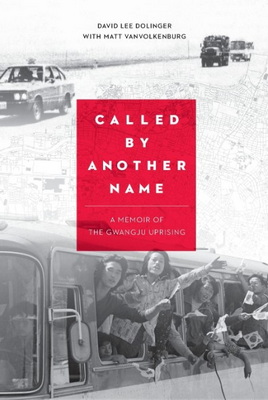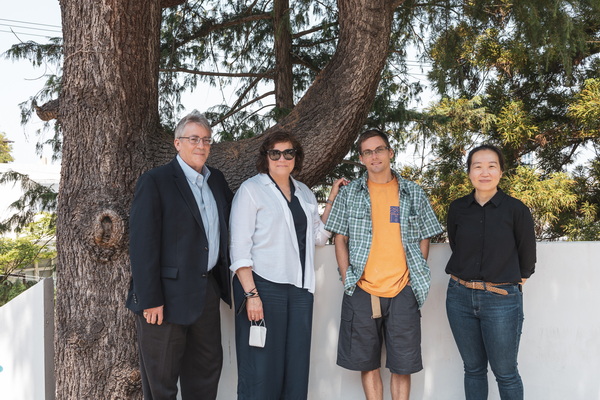Called by Another Name, by David Dolinger and Matt VanVolkenburg
Review by William Urbanski
When David Dolinger first came to South Korea in the late 1970s, it was a very different place. Particularly in rural Jeollanam-do, the advanced infrastructure that we enjoy today, like good, paved roads, excellent public transportation, and incredible telecommunication systems, was all but absent. Beyond the physical differences was an authoritarian political climate that, thankfully, has been lost to the ether of time.
In the popular narrative of South Korea, people generally, and somewhat correctly, believe that this country that has become such an incredible economic and cultural powerhouse was built on sheer hard work. What is so easily overlooked is the human cost and the sacrifice, often by those who were willing to pay the ultimate price for their beliefs, that fundamentally shifted the landscape and laid the true foundation upon which democracy could take hold.

Called by Another Name is David Dolinger’s memoir of his time in the Peace Corps, his entanglement with the events of 5.18, as well as the aftermath. It provides a fresh and uniquely human perspective to key events that began to radically change Korea some forty years ago. This aspect of the book, which gives readers a detailed impression of the day-to-day life in rural Korea before 5.18 and also explores the fallout, is, according to co-author Matt VanVolkenburg, one of the key factors that distinguishes it from other accounts of The Gwangju Uprising.
Called by Another Name is a project that began in earnest mere days after 5.18, when Dolinger began to write down everything he could about what he had witnessed. The result, a product of numerous revisions and a long collaboration with VanVolkenburg – well known in Korea for his popular blog “Gusts of Popular Feeling” – is a book that is extremely well paced, replete with gritty details, and is a must-read for anyone who lives or has lived in Jeollanam-do.
Beginning, Middle, and End
Upon arriving in Korea in the late 1970s, spending a few nights in Seoul and undergoing a three-month orientation in Cheongju, Dolinger made his way to Yeongam, where he worked diagnosing and treating tuberculosis at the local public healthcare center. Anyone who participated in an EPIK (English Program in Korea) or JLP (Jeollanamdo Language Program) orientation session before being sent to their schools will instantly relate to this part of the book and be able to empathize with Dolinger’s experience. I particularly enjoyed his recollections of the Peace Corps orientation session in which Dolinger’s (and other volunteers’) “inability to fit the mold” had him labeled as “insensitive to Korean culture”; strong accusations that would be proven tremendously incorrect by his later actions. This also set up another theme in the book: ongoing friction with the Peace Corps.
With so much that has been said, written, and shown on screen about 5.18, I was somewhat skeptical that I would learn or hear anything new in this book. Any doubts I had were very quickly eradicated and I was drawn in by his personal accounts of the days leading up to 5.18, the carnage that ensued, as well as the events afterwards. Without giving too much of the story away, there is a memorable scene where Dolinger walks into Gwangju from Naju (which would have literally taken all day) since the bus driver, fearful of what was happening in Gwangju, refused to take him any closer into the city. Throughout the book, Dolinger, owing to his status as a foreigner and American, occasionally describes a sense of immunity in Korea; an assumption that is tested in dramatic fashion on this trek into Gwangju, as well as a number of other times throughout the book.
The days he spends downtown during 5.18 revolve around familiar downtown landmarks such as the Provincial Office and the Chonnam University Hospital, where David and his friends put their translation skills to use for the citizens as well as reporters who were in the area. Owing to the trust he built up with the students, Dolinger was able to earn unrestricted access to the Provincial Office and even sat in on a meeting of the student organizers. This perspective is another key feature that distinguishes Called by Another Name from other publications about 5.18.
The book describes the brutality and violence of 5.18 in realistic detail, and when I met Dolinger, he explained that this is one of the main points that many discussions about 5.18 gloss over. People tend to focus on the ideological differences between the parties involved and the desire to form a democracy, but the fact is that the actions taken against the citizens were horrific and excessive.
After leaving Gwangju and being forced out of the Peace Corps, Dolinger felt compelled to stay in Korea for some time, during which he became involved with the Korean dissidents’ information pipeline and was also able to confirm that he was being followed by a detective, possibly a member of the Korean Central Intelligence Agency (KCIA). This part of the book reads a little bit like a spy novel, again making the book hard to categorize.
Overall Impressions

Some of the facts in the book are nothing short of unbelievable. One that particularly astounded me was that following the events of 5.18 over three hundred KCIA agents were placed at Chonnam University, with two in each classroom, in an effort to intimidate students. This was part of a larger effort by the Korean government at the time to prevent people from speaking out and to generally control the narrative around what happened during 5.18.
There is a section near the end of the story in which Dolinger lists his “truths” about what happened during 5.18. In the face of still ongoing efforts to alter the facts around 5.18, I thought it was a good decision to include this part in the book, as it reinforced the idea that certain facts are beyond question.
Another factor that made me hesitant to classify Called by Another Name into a single genre of book is the last sixty or so pages. They contain a touching tribute to Tim Warnberg, one of Dolinger’s close friends who was instrumental in assisting both foreign reporters and citizens during 5.18, but whose contributions have never been fully acknowledged. This section contains letters, numerous personal accounts, as well as “The Kwangju Uprising: An Inside View,” the first ever academic article published in English about 5.18, written by Warnberg.
Even if you have little interest in Korean history, there are some compelling reasons why you should still pick up Called by Another Name. First and foremost, its main story is a fantastic one that moves at a great pace, making it an enjoyable read. On a more philosophical note, the book addresses several important questions that all of us would do well to reflect on. In the chapter “Trying to Stay True,” Dolinger considers how to maintain and work towards the ideals of our youth and live a meaningful life while simultaneously addressing the very real problem of earning a living. I think Dolinger’s solution to this problem is worth considering, because even if you do not agree with his opinions or beliefs, one thing is for sure: Dolinger is a very, very smart man.
Called by Another Name is a book that you will enjoy, will learn a lot from, and that will enhance your understanding of the social and cultural context of 5.18. It should be of interest to anyone who has lived in or visited Korea. Most importantly, in this era of alternative facts and misinformation, it is a credible and stirring account of the astonishing events during one of the darkest chapters of Gwangju’s history.
The Reviewer
William Urbanski is the managing editor of the Gwangju News. Instagram: @will_il_gatto







